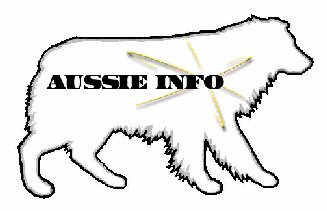
When finished reading any article on this site, please use your "back" button on your browser to return to the main topic pages.
The Australian Shepherd as a Sheep Dog
by Mari Taggart Morrison, From Ranch Dog Trainer, Dec '98/Jan'99 pp. 8-11
"...there remains a strong, devoted group of
dedicated working dog breeders within the breed who still value the natural
working ability of the Aussie and who promote it through hundreds of Australian
Shepherd Club of America herding trials. In fact, many people are coming back
to the Australian Shepherd as a herder - having tried other breeds, the Aussie's
unique qualities as an outstanding working dog, coupled with their great
personalities and devotion as a family companion make them attractive to
families looking for a dog that can "wear many hats" around the farm.
Ron Jacobs is one such rancher who raises commercial and show Columbia sheep,
keeping a flock of 300-500 ewes on their land. When
their old Aussie died, he replaced him with a dog of another breed, but has
since given that dog away and got another Aussie. "I got tired of always having
to keep that new dog in his kennel when we didn't have work to do. All he'd do
was go down to the sheep pens and stare. My kids missed a dog that they could
play with and I missed having a dog that would guard them night and day. I prefer
a dog that will work all day with me but when I'm ready to go do something else,
my dog is right there, wanting to help with that, too!"
The Aussie they now own helps Jacobs gather and sort sheep for shearing, dipping,
sales and shows. "When the work's done he goes off with my kids and plays frisbee and ball and the devil himself could not hurt those kids with him
around," Jacobs states. Jacobs also likes the way Aussies will patrol the
property and guard over the sheep, as well as herd them. "They're not a dog you
leave with sheep, but they will go around outside the pens and make sure coyotes
don't come on the property."
When you talk to working Aussie fans, you hear the same praise about these dog.
They're solid workers, with plenty of force on big flocks, but they're not
obsessed with work when you don't need them to be, and their companionable
qualities make them a superior guard
and best friend for the family.
Nick Davis, of Apache Trails Kennels, got sold on Aussies in 1964, and has since
put 58 stock dog titles on his dogs. He sees lots of advantages to the breed.
"They're reliable and trustworthy on large groups of sheep because they were
used originally on big flocks and
they're a thinking dog that's in tune with the job to be done." He sees the
Aussie's more casual style with less "eye" as a plus. "It's less flashy to the
untrained eye, but the breed's upstanding, more loose-eyed approach can actually
keep sheep calmer." He sees the breed's tendencies to use bark before bite and
ability to even hit a sheep with their shoulder or front foot as giving them
more variety in their styles and thus more options before resorting to stressing
a sheep. Although Aussies are a close-working breed, Davis points out that a
good Aussie CAN get closer to sheep without causing harm, especially if they
have any degree of training.
Rick Pinney is also an ASCA Stockdog judge who has had Aussies for many years.
Pinney owns a flock of 500 - 1000 Coopworth ewes. He
also owns Border Collies and Kelpies, but feels that Aussies are probably the
most versatile breed. "They make as good a companion as they do a working
dog," he states, and describes the breed as having a lot of "flock force" (not
to be confused with just bite) with plenty of push to work big flocks. "There's
a kindness there in Aussies," he says, "Aussies are not a `3-sheep dog' like
some trial dogs - in the everyday world their self-thinking ability is sought
after and bred for."
This point - that Aussies have been bred for big herds or flocks, not a few
sheep in a trial - may help account for their more close-working, broad wearing
style which is suited so well to large numbers of animals. Pinney mentions that
he had seen Aussies on the larger field-trial Post Advanced course often do a
better job in big areas with larger numbers of sheep or cattle. Their powerful,
pushy style may sometime handicap them in small arena trials with just a few
head of stock."